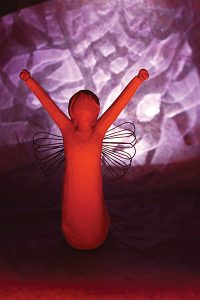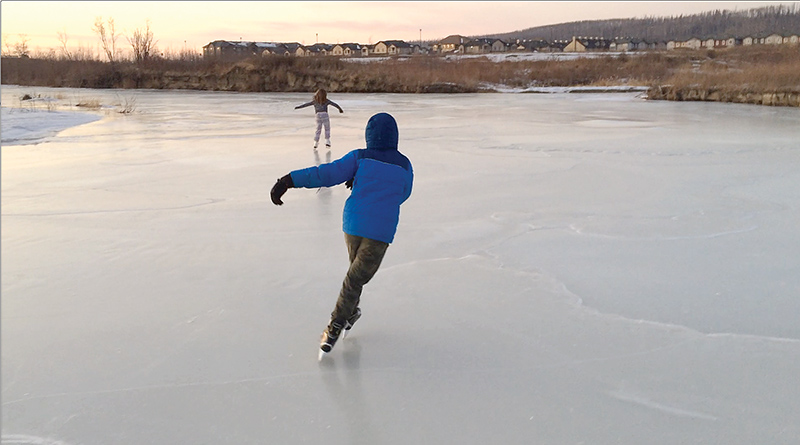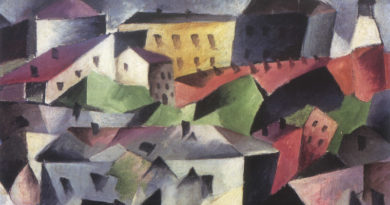Sustaining Hope Through the Winter & New Year
By Dane Neufeld
DEEP IN THE DOLDRUMS of the first lockdown, my family and I headed down into a local river valley to have a campfire. We were surprised that after a major melt, the Hangingstone River had frozen smooth and glassy as far as the eye could see. We returned over the next few days and skated for kilometers up and down the waterway in a state of awe and wonder. Below the snow-covered bitumen cliffs, and under the bridges into town, we glided while marvelling at everything around us. The normally choppy and snow-covered river ice had formed into a beautiful pathway that seemed almost designed to lift our spirits and to remind us that we were being watched over. My wife and I looked with relief and joy as our children swerved freely over the long undulations of ice. It was a great gift when so many of our usual pathways had been closed to us. It lasted for several days before it was buried once again in snow.

The early days of the pandemic were like that. The shock of losing so much of our lives was often offset by unexpected discoveries. Though the circumstances of March and April took us off guard, there was novelty and energy in the adjustments we made in our lives, and in the life of the Church. But now, as most of the country is already immersed in a second series of restrictions and lockdowns, there is a heavier sense of resignation in the air. This time around feels different and as we approach Christmas we cannot rely on the usual currents of warmth and wonder that wash over us. We are not even sure if we can be with our families or sing our favorite carols on Christmas Eve. All we want is for this pandemic to be over.
There is a distance and emptiness that pervades pandemic life almost like a veil that separates us from the heart of what we love most. There are few things we can enter into fully, and everywhere we turn there are obstacles and limitations. Everything feels partial, curtailed, a few steps removed from the real thing – whatever that may be. It doesn’t seem to matter that our pre-pandemic lives were often scattered in a thousand directions. It is hard not to imagine that our lives used to be full of rich meaning, connection and purpose. At times it is even difficult to fathom that we could have ever been unhappy in a world where we could embrace each other freely, worship without restraint or sit around a table with friends and laugh after a meal.
Increasingly our desire for normal has grown so intense it is not even clear to me what normal is. When people speak of the new normal it gives the impression that they know exactly what is happening now and what will continue to happen in the future. But our efforts to contain the contingency of the world usually fail to bring the order and structure we desire. Reality is always slipping beyond our efforts to control it and if the pandemic has made anything clear, it is that we are in the grip of something far more powerful than we are.
The liturgical calendar plays a deep role in forming our spiritual lives – and sometimes that is through the way it unsettles us when we expect simple assurance. There is little, for example, about the Advent lectionary that should lead us to expect an orderly preparation for the Lord’s arrival. Advent One is full of disorientation: “When you did awesome deeds that we did not expect, you came down, the mountains quaked at your presence” (Isaiah 64:3). Likewise, Mark’s gospel suggests a time of upheaval and cosmic chaos: “In those days, after that suffering, the sun will be darkened, and the moon will not give its light, and the stars will be falling from heaven, and the powers in the heavens will be shaken” (Mark 13:24). Stability is a deeply important reality in our world, but not when that stability functions as a barricade to keep God out of our lives. Stability can quickly become complacency or even arrogance and in that case, our flimsy fortresses will inevitably be shaken.
It seems darkly comical that this time last year we preachers were issuing the usual warnings about the real meaning of Christmas somehow being lost in the annual hustle and bustle. This year there will be very little hustle and bustle, but will the true meaning of Christmas suddenly emerge without its seasonal contenders? There may be an unexpected irony at work here: without the usual distractions and busyness of the season the reality of Christmas may seem even further away. This possibility is a thread that runs through the whole pandemic experience. When all the schedules, routines, activities and pretenses of our lives were stripped away, did we draw nearer to some essential truth or did we find ourselves staring down an empty hallway?
Our hope for a vaccine has become nearly eschatological – “But about that day or hour no one knows.” There are predictions and best guesses, but no one knows the day when we will peel the direction arrows off our church floors, or remove the capacity limits from our buildings. But there is something misleading about this hope, if it only temporarily satisfies our longing for the presence of the Lord in our lives. The pandemic has revealed to us the fragility of our souls and our civilization, something we are almost desperate to forget.
With so much of the ordinary Christmas season threatened, we are left with the sense of a trembling and vulnerable world, where the powers have been shaken, and our uncertain lives seem ripe for some kind of resolution. This is in fact much more like Advent than normal. This is the kind of world Mary and Joseph travelled across to carry out their vocation. It is into this world that the Christ Child was born for our salvation.
Like everyone else I cannot wait for this pandemic to be over. I am ready for the fuller colours of life to return, the endless variety of small things that uphold and sustain us, by God’s grace. The effects of the pandemic on human life and community have been devastating. We were not created for isolation and social distancing, but for the sweeping embrace of fellowship with each other and with God. However, while we are in this restricted space, there are things that God will show us. There are unexpected miracles to behold; there are old patterns that need breaking; there are human and natural encounters to challenge and renew us; there will be pathways that open just long enough for us to pass through. It is now and not later, that we should expect to encounter the Lord. TAP
Dr. Dane Neufeld is Rector of St James Church in Calgary, Alberta.




